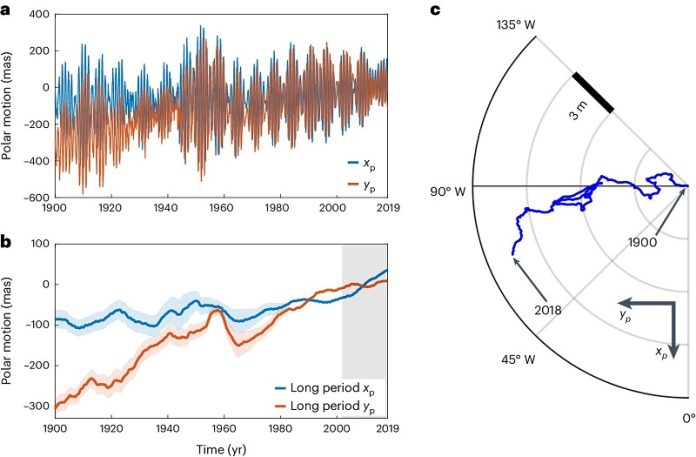
For the first time, researchers at ETH Zurich have fully explained how climate change is affecting the Earth’s rotation and its axis.
Using advanced AI methods, they discovered that climate change has a greater impact on the Earth’s rotation speed than the moon, which has influenced the length of our days for billions of years.
Climate change is causing ice in Greenland and Antarctica to melt. This melting ice flows into the world’s oceans, especially around the equator.
According to Professor Benedikt Soja from ETH Zurich, this mass shift is similar to a figure skater extending their arms while spinning, which slows down their rotation.
In the same way, when Earth’s mass moves away from its axis, its rotation slows down, making days slightly longer.
The ETH researchers published their findings in two studies in the journals Nature Geoscience and Proceedings of the National Academy of Sciences (PNAS). They found that climate change will increase the length of a day by a few milliseconds due to water moving from the poles to lower latitudes.
This process slows down Earth’s rotation more than the tidal friction caused by the moon.
“Our actions have a greater impact on Earth than we realize,” says Professor Soja. “This places a significant responsibility on us to protect our planet’s future.”
In addition to slowing down Earth’s rotation, the melting ice also shifts the planet’s axis. This means the points where Earth’s axis meets the surface move. Researchers observed this polar motion, noting that over long periods, the axis can shift by about ten meters every hundred years. Movements inside the Earth, such as in the mantle and outer core, also contribute to this shift.
Using physics-informed neural networks, the research team combined physical laws with AI to develop accurate models of these processes. These models show how individual events in Earth’s core, mantle, and surface interact to cause polar motion. This comprehensive modeling is a first, explaining why and how Earth’s axis moves relative to its crust.
Doctoral student Mostafa Kiani Shahvandi, the lead author of the study, points out that climate change is causing the Earth’s axis to move, and this movement is also affecting the dynamics of the Earth’s core. However, these effects are minor and not a cause for concern.
The researchers’ AI-based algorithms have recorded the movements of Earth’s rotational poles since 1900, matching real data from past astronomical observations and satellite measurements over the last thirty years. This allows for accurate future predictions.
Even small changes in Earth’s rotation can impact space travel. According to Soja, this effect must be considered when navigating in space, such as when landing a space probe on another planet. A tiny deviation on Earth can become a huge error over vast distances, making precise calculations crucial for successful space missions.



